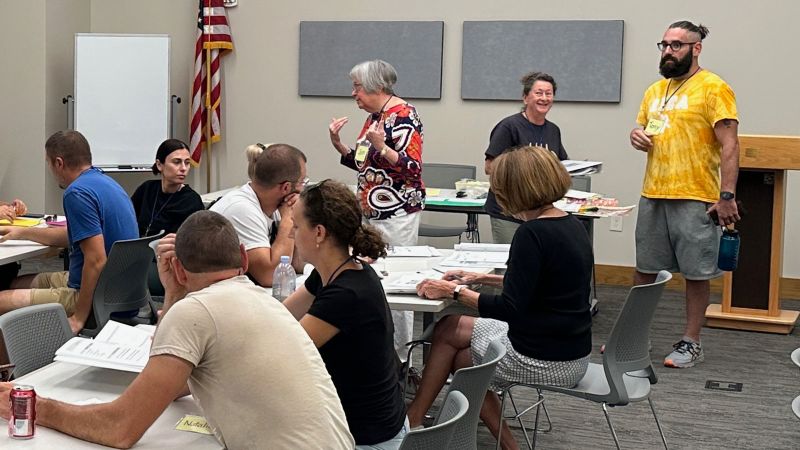Sasha and his family found themselves in Hartsville, South Carolina, a small town that was largely unfamiliar to them when they relocated in September 2022. They arrived in the United States as part of a wave of Ukrainian refugees fleeing the war ignited by Russia’s invasion of their homeland. Having been uprooted from their lives in Kyiv, Sasha and his family are not alone, as many other Ukrainians have also settled in this rural community, which has welcomed them with open arms as they seek to rebuild their lives.
For Sasha, the United States represented a beacon of hope—a “fortress of democracy, of freedom, of opportunities.” In his own words, he expressed a sense of renewal, saying, “finally, finally, I’m in the place where I can begin my life all over again.” He, along with his wife and young daughter, are part of the approximately 280,000 Ukrainians who came to the United States through the “Uniting for Ukraine” (U4U) program, a humanitarian initiative that permitted U.S. citizens to sponsor the settlement of Ukrainian refugees.
However, the new life Sasha’s family is attempting to build appears to be under threat. Uncertainties loom over their future due to a pause in decisions on parole extensions, temporary protected status, and work authorizations, tied to sweeping changes in immigration policy initiated during the Trump administration. Curtis Lee, a key sponsor for Sasha’s family, voiced his concerns, stating, “This really could be catastrophic, not just for the Ukrainian families, but for our community.”
The U.S. Citizenship and Immigration Services (USCIS) confirmed that there is currently an administrative hold on all pending benefit requests by parolees under the U4U initiative. This pause aims to facilitate additional vetting to ensure public safety, as stated by a USCIS spokesperson. The implications of such delays are grave, as they threaten many Ukrainian families with uncertainty and the potential to uproot their lives once more.
Liana Avetisian and Alina Mirzoian, Ukrainian cousins now residing in DeWitt, Iowa, exemplify the plight of many. They have invested significant resources in navigating the U.S. immigration system but find themselves trapped in bureaucratic limbo, with their applications for temporary protected status stalled. Avetisian openly expressed feelings of betrayal due to the current situation, which has not only affected her but also the broader local community, leading to distress among families who have formed strong connections with the newcomers.
Boelens, president of Iowa Newcomer Community and Exchange (IA NICE), remarked on community-wide devastation and the emotional toll imposed on schools and families, as parents and children grapple with the potential separation. Community members had rallied to support the Ukrainian newcomers, fundraising to create transitional housing, yet insecurity now casts a shadow over these efforts. “This entire community feels really hurt, and this is a very, very red community, they’re in disbelief,” she noted, highlighting the impact on local emotional and social dynamics.
Employers such as Sam Heer, who has directly benefited from hiring Ukrainian workers, have expressed concern that losing these individuals would significantly harm their businesses. He described them as valuable contributors who are eager to learn and work for their families’ well-being. The looming uncertainty for both employees and the community underscores the interconnectedness formed through these sponsorship and support networks.
One added layer of complexity arises from the reality that these refugees have actively participated in following legal processes, passed background checks, and contributed through taxes. Curtis Lee, a supporter of the U4U program, highlighted that the program aligns with the administration’s perspective by minimizing costs to the government while fulfilling humanitarian obligations.
As discussions continue regarding the future of the U4U program and the fate of countless families, the emotional toll is palpable. Many like Sasha, who had just begun finding their footing in a new land, find themselves grappling with the fear of returning to a war-torn country from which they fled. The longing for stability, especially for children like Sasha’s daughter, who has just started calling their new home “home,” underscores the need for compassion and clarity in immigration policies affecting these families.
In DeWitt and Hartsville, every individual represents a story of resilience and hope amidst chaos. Yet, uncertainty and fear linger, as many yearn for a sense of security that eludes them in these transitional times. The experiences shared by these families illuminate broader narratives of displacement, community support, and the fundamental human yearning for a safe and stable home.



